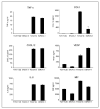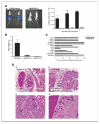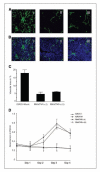The inflammatory cytokine tumor necrosis factor-alpha generates an autocrine tumor-promoting network in epithelial ovarian cancer cells
- PMID: 17234767
- PMCID: PMC2679985
- DOI: 10.1158/0008-5472.CAN-06-2941
The inflammatory cytokine tumor necrosis factor-alpha generates an autocrine tumor-promoting network in epithelial ovarian cancer cells
Abstract
Constitutive expression of the inflammatory cytokine tumor necrosis factor-alpha (TNF-alpha) is characteristic of malignant ovarian surface epithelium. We investigated the hypothesis that this autocrine action of TNF-alpha generates and sustains a network of other mediators that promote peritoneal cancer growth and spread. When compared with two ovarian cancer cell lines that did not make TNF-alpha, constitutive production of TNF-alpha was associated with greater release of the chemokines CCL2 and CXCL12, the cytokines interleukin-6 (IL-6) and macrophage migration-inhibitory factor (MIF), and the angiogenic factor vascular endothelial growth factor (VEGF). TNF-alpha production was associated also with increased peritoneal dissemination when the ovarian cancer cells were xenografted. We next used RNA interference to generate stable knockdown of TNF-alpha in ovarian cancer cells. Production of CCL2, CXCL12, VEGF, IL-6, and MIF was decreased significantly in these cells compared with wild-type or mock-transfected cells, but in vitro growth rates were unaltered. Tumor growth and dissemination in vivo were significantly reduced when stable knockdown of TNF-alpha was achieved. Tumors derived from TNF-alpha knockdown cells were noninvasive and well circumscribed and showed high levels of apoptosis, even in the smallest deposits. This was reflected in reduced vascularization of TNF-alpha knockdown tumors. Furthermore, culture supernatants from such cells failed to stimulate endothelial cell growth in vitro. We conclude that autocrine production of TNF-alpha by ovarian cancer cells stimulates a constitutive network of other cytokines, angiogenic factors, and chemokines that may act in an autocrine/paracrine manner to promote colonization of the peritoneum and neovascularization of developing tumor deposits.
Figures





References
-
- Moore R, Owens D, Stamp G, et al. Tumour necrosis factor-α deficient mice are resistant to skin carcinogenesis. Nat Med. 1999;5:828–31. - PubMed
-
- Arnott CH, Scott KA, Moore RJ, et al. Tumour necrosis factor-α mediates tumour promotion via a PKCα- AP-1-dependent pathway. Oncogene. 2002;21:4728–38. - PubMed
-
- Pikarsky E, Porat RM, Stein I, et al. NF-κB functions as a tumour promoter in inflammation-associated cancer. Nature. 2004;431:4461–6. - PubMed
-
- Szlosarek PW, Grimshaw MJ, Kulbe H, et al. Expression and regulation of tumor necrosis factor-α in normal and malignant ovarian epithelium. Mol Cancer Ther. 2006;5:382–90. - PubMed
-
- Szlosarek P, Balkwill F. Tumour necrosis factor-α: a potential target in the therapy of solid tumors. Lancet Oncol. 2003;4:565–73. - PubMed
Publication types
MeSH terms
Substances
Grants and funding
LinkOut - more resources
Full Text Sources
Other Literature Sources
Medical
Miscellaneous

